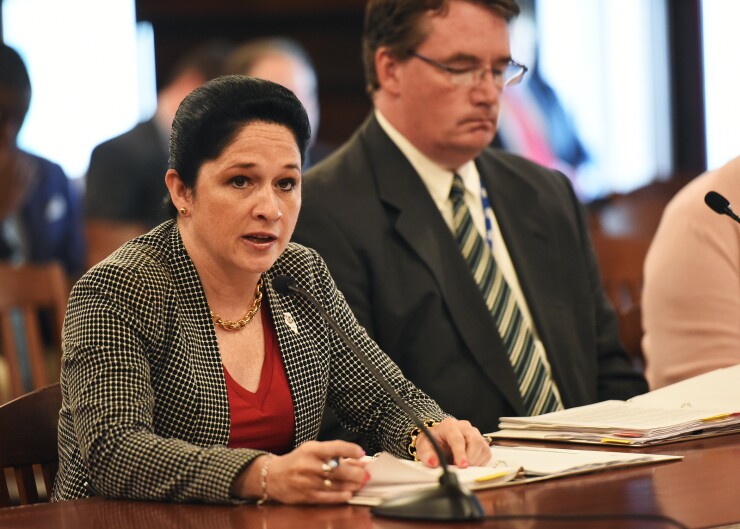CHICAGO – Illinois violated consent decrees by allowing $2 billion in Medicaid bills to pile up, a federal judge ruled Wednesday.
The
The decision from Judge Joan Lefkow of the U.S. District Court for the Northern District of Illinois’ Eastern Division gives the state some breathing room by allowing time to reach a negotiated agreement.

“The parties are directed to continue to negotiate to achieve substantial compliance with the consent decrees in these cases,” said the order released late Wednesday. “If they cannot reach a negotiated solution, either party may make an appropriate motion, to be noticed for presentment on June 20, 2017, at 10:00 a.m.”
The “solution” stands to influence investor sentiments over the state’s ability to meet its obligations, may prompt other stakeholders starved for payment to seek court help, and could threaten the state’s already freshly downgraded credit due to the two-year-old budget impasse.
The state has been operating
Moody’s Investors Service and S&P Global Ratings downgraded the state to the lowest investment grade level of Baa3/BBB-minus last week. Moody’s cited court orders adding to the list of priority payments as a factor that could lead to another hit.
After Wednesday's ruling, Moody’s lead Illinois analyst Ted Hampton said the court action “does not amount to any kind of mandate for the state to pay.”
S&P made clear a drop to junk likely looms absent a budget agreement by the start of the fiscal year July 1.
Fitch Ratings has said it views the beginning of the new fiscal year as a key marker for a downgrade of the state’s BBB rating.
The latest court action stems from consent decrees reached years ago and reinforced in 2015. They require the state to pay Medicaid providers in a timely and expedited fashion to ensure that patients are not deprived of care regardless of whether there’s a budget appropriation in place.
The recipients recently returned to court arguing that the state’s prioritization of some obligations over Medicaid providers and managed care organizations, or MCOs, violated the prior orders and were jeopardizing medical services due to the length and size of payment delays.
The pressure is now on state Comptroller Susana Mendoza’s office -- which manages bill payments. She must meet the demand for “substantial compliance” with little additional cash after other “core” priority monthly obligations are met.
“The lack of a budget for the last two years has created a situation in which we now have more court-ordered and state-mandated payments than we have revenues to cover them,” Mendoza warned in a statement. “The real solution to this crisis is a comprehensive budget plan passed by the General Assembly and signed by the governor -- now.”
Lawyers from Attorney General Lisa Madigan’s office argued there was no violation because the state continues to do its best to pay down Medicaid bills in a timely fashion despite the lack of revenue.
Lefkow disagreed and in her ruling questioned why “the comptroller is funding the state payroll as well as debt service at 100%, respectively $370 million and $226 million each month…yet Medicaid payments total just $160 million per month, not including any payment to the MCOs.
“The comptroller has failed so far to demonstrate a lawful basis to disregard this court’s orders … compliance with a state statute does not excuse failure to comply with a federal consent decree,” she wrote.
Lefkow said Mendoza faces an unenviable situation but “minimally funding the obligations of the decrees while fully funding other obligations” violates legal orders. Plaintiffs are not asking the state to make good on all the overdue bills but to make payments sufficient to maintain medical services. “This is a reasonable position,” she wrote.
In the state’s latest filing submitted Tuesday, AG lawyers asked the judge to put off the effective date of any court order elevating Medicaid over other payment obligations until July 1 to help raise political pressure to resolve the budget stalemate and avert further downgrades.
About 90% of the state's scheduled spending continues under continuing appropriations, consent decrees, and court orders, though it does not have enough revenue to do so, leading to the bill backlog in the comptroller's office. In addition to payroll and debt service, the state makes $593 million in monthly pension payments and sends $270 million in aid to school districts.
“Core” payments total $2.1 billion monthly and consume about 90% of monthly revenues.
Adjusting the status of payment obligations would not immediately impact state GO repayment because the state sets aside in monthly allotments funds needed for debt service 12 months ahead of due dates. GOs enjoy far-reaching protections under the state's GO Bond Act which provides an irrevocable and continuing appropriation and extends beyond a reliance on general fund revenues.
All legally available revenue including special funds totaling about $10.8 billion can be tapped. The state constitution also includes a non-impairment provision that prohibits General Assembly action that impairs the obligations of a contract between the state and its bondholders and bondholders can bring suit to compel the state to meet its obligations.
The escalating pressure caused by the budget delay could eventually render those protections moot, analysts say.
The state’s precarious cash flow was underscored by reports this week from the General Assembly’s Commission on Government Forecasting and Accountability. May revenues were up by $144 million but overall revenue with just one month left in the fiscal year totaled just $26.5 billion, down $955 million, or 3.5%, from the previous year.
COGFA also warned of a $6.2 billion deficit this year and a $7.7 billion deficit in fiscal 2018 absent changes in spending or revenue projections. The state will spend more than $38 billion this year while revenues total just $32 billion. Revenues next year are projected at $32.1 billion while spending will rise to $39.8 billion. That means the backlog will grow from about $15 billion at the end of this fiscal year to $22.7 billion next year.





